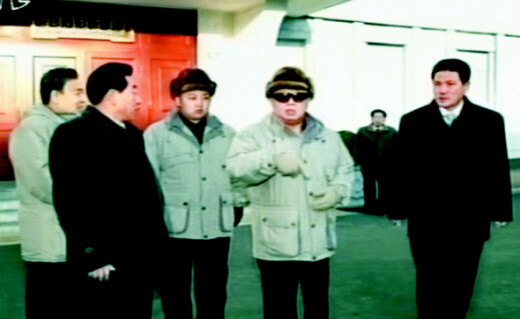hankyoreh
Links to other country sites 다른 나라 사이트 링크
Framework of inter-Korean military talks remains uncertain

Son Won-je, Staff Writer
High-level talks between North Korean and South Korean military leaders and authorities are in sight for the first time since the Lee Myung-bak administration took office, but a number of hurdles remain before they actually come to pass.
The first is the preliminary meeting toward the holding of senior military talks as proposed by North Korea will take place Thursday. The South Korean government plans to propose a time, place, and delegation plan for this meeting via military communications lines some time in the middle of next week.
“The actual preliminary meeting appears likely to take place around mid-February,” Defense Ministry spokesman Kim Min-seok said Friday.
As this would be a working-level meeting, there is a strong chance the chief delegate will be a working-level official at the level of colonel.
The South Korean government plans to clearly ascertain the grade and agenda for the military talks at the preliminary meeting and go on from there.
Regarding the grade of the “high-level” talks, the Ministry of National Defense initially said, “It would not be wrong to interpret it as a defense ministers’ meeting.” However, the ministry later said, “It could be a ministers’ meeting, and it could be a generals’ meeting.”
The South Korean government is threatening to only proceed to the main talks if the agenda of responsible measures from North Korea regarding the Cheonan sinking and artillery attack on Yeonpyeong Island and a firm promise not to engage in further provocations is set in stone at the preliminary talks. Experts are predicting that if North Korea dodges the issue with the argument that the matters can be discussed in detail at the main talks, Seoul will not be able to reject the main talks out of hand, if only out of consciousness of the positions of the U.S. and China, both of which hope to see inter-Korean dialogue.
Even if the main talks manage to take place, analysts say it is difficult to be optimistic about the outcome.
In a briefing Friday, Unification Ministry spokesman Chun Hae-sung defined “responsible measures” regarding the Cheonan and Yeonpyeong Island incidents as “an acknowledgement and apology from North Korea and a firm promise to prevent a reoccurrence” of future provocations.
However, many analysts predict a strong likelihood that North Korea, while expressing regret over the Yeonpyeong Island attack, will either counter on the Cheonan issue by continuing to maintain its innocence and proposing a joint investigation, or merely provide a roundabout statement of preventing a reoccurrence, such as proposing that North Korea and South Korea “work together so that no more unfortunate business takes place in the West Sea.” The framework could fall apart if Seoul is not satisfied with this.
Another factor that could determine the direction of dialogue between authorities is the senior-level talks that Seoul announced it would be proposing separately to confirm Pyeongyang’s genuine intent to denuclearize. However, analysts predict negative repercussions on the military talks as well if North Korea rejects this proposal and insists on discussing the nuclear issue at the six-party talks.
Please direct questions or comments to [englishhani@hani.co.kr]
Editorial・opinion
![[Column] Season 2 of special prosecutor probe may be coming to Korea soon [Column] Season 2 of special prosecutor probe may be coming to Korea soon](https://flexible.img.hani.co.kr/flexible/normal/500/300/imgdb/original/2024/0426/3317141030699447.jpg) [Column] Season 2 of special prosecutor probe may be coming to Korea soon
[Column] Season 2 of special prosecutor probe may be coming to Korea soon![[Column] Park Geun-hye déjà vu in Yoon Suk-yeol [Column] Park Geun-hye déjà vu in Yoon Suk-yeol](https://flexible.img.hani.co.kr/flexible/normal/500/300/imgdb/original/2024/0424/651713945113788.jpg) [Column] Park Geun-hye déjà vu in Yoon Suk-yeol
[Column] Park Geun-hye déjà vu in Yoon Suk-yeol- [Editorial] New weight of N. Korea’s nuclear threats makes dialogue all the more urgent
- [Guest essay] The real reason Korea’s new right wants to dub Rhee a founding father
- [Column] ‘Choson’: Is it time we start referring to N. Korea in its own terms?
- [Editorial] Japan’s rewriting of history with Korea has gone too far
- [Column] The president’s questionable capacity for dialogue
- [Column] Are chaebol firms just pizza pies for families to divvy up as they please?
- [Column] Has Korea, too, crossed the Rubicon on China?
- [Correspondent’s column] In Japan’s alliance with US, echoes of its past alliances with UK
Most viewed articles
- 1No good, very bad game for Korea puts it out of Olympics for first time since 1988
- 2Division commander ordered troops to enter raging flood waters before Marine died, survivor says
- 3Korea’s 1.3% growth in Q1 signals ‘textbook’ return to growth, says government
- 4Will NewJeans end up collateral damage in internal feud at K-pop juggernaut Hybe?
- 5[Column] Season 2 of special prosecutor probe may be coming to Korea soon
- 6[Editorial] Korea’s surprise Q1 growth requires objective assessment, not blind fanfare
- 7[Column] ‘Choson’: Is it time we start referring to N. Korea in its own terms?
- 8‘We must say no’: Seoul defense chief on Korean, USFK involvement in hypothetical Taiwan crisis
- 9Korea sees more deaths than births for 52nd consecutive month in February
- 10Is N. Korea threatening to test nukes in response to possible new US-led sanctions body?